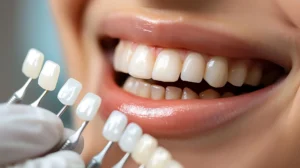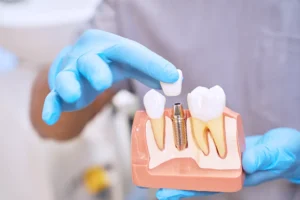Table of Contents
Hearing you need a tooth pulled can feel intimidating, but the procedure is straightforward and often the healthiest choice when a tooth can’t be saved. Billings West Dental focuses on comfort, clear communication, and a smooth recovery—so you know what to expect at every step.
What Is a Tooth Extraction?
A tooth extraction is the complete removal of a tooth from its socket. Dr. Low may recommend an extraction when extensive decay, infection, or trauma makes it impossible to restore the tooth with other treatments like fillings, crowns, or a root canal. Removing a severely compromised tooth helps protect surrounding teeth and gum tissue and can relieve persistent pain or infection.
Types of Tooth Extractions We Perform
At Billings West Dental, extractions fall into two main categories. Dr. Low will explain which approach is right for your situation.
Simple extraction
The tooth is loosened and removed in a single piece. This is common when the tooth is fully erupted and accessible.
Surgical extraction
The tooth is sectioned and removed in pieces. In some cases, a small amount of bone is carefully removed around the tooth to aid access. This option is used when a tooth is broken at the gumline, badly decayed, or otherwise difficult to reach.
Step-by-Step: What to Expect During Your Visit
- Evaluation and planning
We review your health history, examine the area, and take any necessary imaging. Dr. Low explains the plan, answers questions, and reviews aftercare so you’re prepared. - Comfort first
Local anesthesia is used to numb the area thoroughly. If you’re anxious, we also offer conscious oral sedation: a prescription medication taken at our office before treatment that helps you feel deeply relaxed while remaining awake. You’ll need a trusted driver to and from your appointment, and you may feel drowsy afterward. - Extraction
For simple extractions, the tooth is gently loosened and removed. For surgical cases, the tooth may be sectioned and removed in smaller pieces to protect surrounding bone and tissue. - Site care
The socket is cleaned, and gauze is placed to help form a clot. Dr. Low will review personalized instructions and discuss pain management options. - Next steps
If a replacement tooth is recommended, we’ll outline timing and choices—dental implant, bridge, or partial denture—so you can plan with confidence. (Learn more about implants from the Mayo Clinic.)
Top 5 Tips for a Smooth Recovery
- Protect the clot
For the first 24 hours, bite gently on gauze as directed, avoid spitting or using straws, and skip vigorous rinsing. These habits help prevent dry socket and support healing. - Manage swelling and discomfort
Use a cold compress on the outside of your cheek in 10–20 minute intervals during the first day. Take recommended pain relievers as directed. - Choose soft, cool foods
Yogurt, smoothies (no straws), scrambled eggs, and mashed potatoes are easy on the area. Avoid hot, crunchy, or spicy foods for a couple of days. - Keep it clean—carefully
Brush and floss your other teeth as usual, but avoid the extraction site the first day. Starting day two, gently rinse with warm salt water after meals unless Dr. Low gives different instructions. - Take it easy
Limit strenuous activity for 24–48 hours. Elevate your head when resting to reduce swelling, and avoid smoking or vaping, which can delay healing.
Red Flags: When to Call Us
Mild soreness and slight oozing are normal early on. Contact Billings West Dental right away if you notice any of the following:
- Severe pain that worsens after day two
- Persistent bleeding that doesn’t slow with pressure
- Fever, chills, or spreading swelling
- Bad taste or odor that doesn’t improve
- Numbness or tingling that lingers
We’re here to help—don’t hesitate to reach out with questions during recovery.
Replacing a Missing Tooth: Your Options
Extracting a severely damaged tooth often solves pain and infection, but replacing the tooth helps keep your bite stable and your smile complete.
Dental implant with crown
A long-term solution that replaces the root and crown. Feels and functions like a natural tooth and helps support the jawbone.
Dental bridge
A fixed restoration that fills the space using crowns on neighboring teeth. A reliable option when an implant isn’t ideal.
Partial denture
A removable appliance that replaces one or more teeth. Budget-friendly and can be a temporary or longer-term choice.
Our team will help you compare timing, maintenance, and longevity so you can choose the right path forward.
Frequently Asked Questions About Tooth Extractions
Why would I need a tooth extraction?
When decay, infection, or trauma makes a tooth non-restorable, removal protects your oral health and relieves symptoms. We only recommend extraction when conservative options aren’t appropriate.
Is the procedure painful?
You’ll be thoroughly numbed with local anesthesia. Pressure is common, but sharp pain is not. If you’re anxious, conscious oral sedation can help you stay calm and comfortable. You’ll remain awake, need a driver, and may feel drowsy afterward.
How long is recovery?
Most patients feel much better within a couple of days and resume normal routines quickly. Soft foods are helpful for 24–48 hours. Full healing of the socket takes several weeks.
When can I brush and floss?
Brush and floss the rest of your mouth the same day (avoid the site). Starting day two, gently rinse with warm salt water after meals unless instructed otherwise.
How much does a tooth extraction cost?
Costs vary based on whether the extraction is simple or surgical and the tooth’s condition. Simple extractions generally cost less than surgical extractions.
Gentle, Clear Care from Billings West Dental
If you’ve been told you need an extraction—or you’re dealing with significant pain or infection—Dr. Low and our team at Billings West Dental will guide you through treatment and recovery with care. We’ll answer your questions, support your comfort, and help you plan smart next steps so your smile stays healthy for the long run. Ready to talk through your options? Call our office in Billings, MT to schedule a visit.



